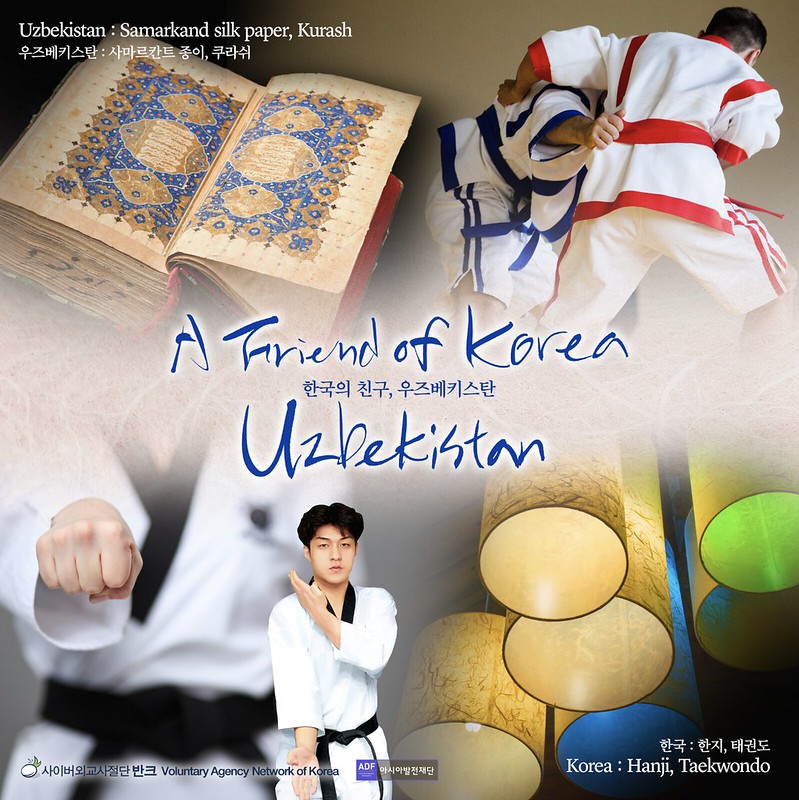
한국의 친구, 우즈베키스탄
천 년이 가는 종이, 우즈베키스탄의 사마르칸트 종이와 한국의 한지를 아시나요?
우즈베키스탄에는 비단 종이라고 불리며 보석과 같은 가치를 지녔던 ‘사마르칸트 종이’가 있습니다. 뽕나무로 만든 사마르칸트 종이는 유럽 각국으로 퍼져서 제지술을 전파했습니다.
한국 고유의 전통적인 방법으로 만든 한지는 세계적으로도 인정받는 종이입니다. 한지를 만들 때는 닥나무를 아흔아홉 번 손질한 뒤 한 번 더 만져야 완성되기에 백 번의 정성이 담겼다고 합니다. 세계에서 가장 오래된 목판 인쇄물인 무구정광대다라니경과 세계에서 가장 오래된 금속활자본 직지 또한 한지에 인쇄되어 현재까지 보존될 수 있었습니다.
우즈베키스탄의 대표적인 전통 무술 쿠라쉬는 3500년의 역사를 가지고 있습니다. 영토 확장과 문화에 관심이 많았던 아미르 티무르 왕은 군인들의 전투력을 높이고, 체력과 정신력을 단련시키기 위해 쿠라쉬를 적극적으로 권장했습니다. 쿠라쉬는 상대편 선수를 먼저 넘어뜨리면 승리하는 방식으로 한국의 씨름과 비슷합니다. 두 선수는 각각 초록색과 파란색 도복인 ‘약탁’을 입고 흰 바지와 붉은 띠를 착용합니다.
우즈베키스탄 사람들이 쿠라쉬를 자랑스럽게 여기듯이, 한국인들이 자랑스럽게 생각하는 한국의 전통 스포츠는 태권도입니다. 오 천년의 역사를 지닌 대한민국의 대표적인 무예인 태권도는 전 세계인이 함께 즐기는 세계적인 스포츠입니다. 한국의 전통문화 속에서 발전해온 태권도는 신체적인 단련뿐 아니라 정신적인 수련과 예의를 강조합니다.
우즈베키스탄의 쿠라쉬는 2018년 아시안게임에서, 한국의 태권도는 2000년도에 올림픽 정식 종목으로 확정되었습니다. 전 세계인들은 우즈베키스탄의 쿠라쉬와 한국의 태권도를 통해 언어와 인종, 역사와 문화를 넘어서 하나가 됩니다.
Have you heard about Uzbekistan’s 1000-year-old Samarkand paper production and Hanji(Korean traditional paper)?
The Samarkand silk paper has gained global recognition and popularity for over 1000 years.
Made of mulberry tree bark, cotton, and silk, this famous paper spread across Europe, disseminating traditional Uzbek papermaking methods.
Likewise, Hanji, made with its own traditional methods, achieved global fame for centuries. Hanji was also known as hundred-paper because the user’s touch on the paper would be the 100th touch after the papermaking master’s laborious 99 touches.
Mugujeonggwang Daedaranigyeong, the world’s oldest extant woodblock print, and Jikji, the world’s oldest extant movable metal type print, have been impeccably preserved because they were printed on durable Hanji.
Uzbekistan’s national wrestling Kurash has over 3,500 years of tradition. With interest in territorial expansion and cultural prosperity, ruler Amir Timur trained his soldiers in Kurash to increase their physical and mental fitness.
The wrestler who takes his opponent down first wins, which is the same in Korean wrestling called Ssireum. In Kurash, two wrestlers wear green or blue uniforms called Yakhtak, white trousers, and a red belt.
Like Uzbeks being proud of Kurash, Koreans are proud of Taekwondo, Korea’s traditional martial art. Taekwondo, which developed over Korea’s five thousand years of history, has become a global sport. It emphasizes not only physical and mental training but also respect for each other.
Like Kurash being adopted by the Asian Games in 2018, Taekwondo was adopted by the Olympic Games as an official sport in 2000. Through Kurash and Taekwondo, people across the world unite as one across languages, races, history, and culture.








